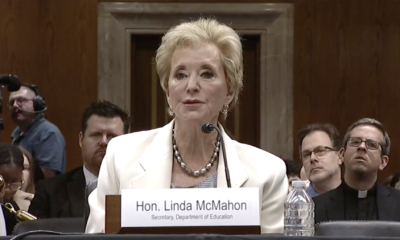American Enterprise Institute
Trump’s Tariffs Target Canada, Mexico, and China—Effective February 1

WASHINGTON — President Donald Trump is set to impose new tariffs on imports from Canada, Mexico, and China, beginning Saturday. This decision could ignite a trade war, raising prices on groceries and a range of goods.
During a Friday briefing, White House press secretary Karoline Leavitt announced that Trump will enforce a 25% tariff on items from Canada and Mexico, alongside a 10% tariff on goods from China. Businesses importing these goods typically pass increased costs onto consumers, meaning everyday products could become more expensive.
Leavitt explained the reasoning behind the tariffs, citing an “unprecedented invasion of illegal fentanyl” through these countries impacting American citizens. “Both Canada and Mexico have allowed this issue to escalate,” she stated.
As of now, Trump has not confirmed whether he will extend tariffs to the European Union, which consists of 27 member countries. “I won’t get ahead of the president on tariffs regarding the EU,” Leavitt remarked.
In a later statement from the Oval Office, Trump clarified that his intent with these tariffs isn’t to create leverage but rather to generate revenue and highlight the fentanyl crisis. “We’re not looking for a concession. We’ll just see what happens,” he said.
These new tariffs will be layered on top of existing ones, which Trump plans to expand further. Future targets mentioned include computer chips, oil and gas, as well as pharmaceuticals. He suggested that tariffs on oil and gas could be implemented around February 18, although specific dates for other tariffs remain unclear.
Trump dismissed concerns about inflation and stock market reactions to the impending tariffs, reaffirming his goal to decrease inflation during his tenure.
Numerous economists, including those from conservative institutions like the American Enterprise Institute, have expressed skepticism regarding Trump’s tariff strategy. Phil Gramm, former Republican senator, and Larry Summers, a former Treasury Secretary, warn against the economic consequences of such measures. They argued in a Wall Street Journal op-ed that tariffs distort domestic production and harm overall economic growth.
Leavitt emphasized that any decision to alter or revoke tariffs lies solely with Trump, even as concerns about potential impacts on the U.S. economy linger. According to the U.S. Department of Agriculture, Canada and Mexico rank as the nation’s first and third largest agricultural product suppliers.
The Office of the United States Trade Representative reported that the U.S. imported $562.9 billion worth of goods from China in 2022. In the same year, U.S. agricultural exports to China were valued at $36.4 billion, a figure that could be jeopardized by retaliatory measures.
Export growth to China has shown positive trends in recent years, with significant contributions from U.S. soybeans, corn, beef, and cotton. These agricultural products play a crucial role in the overall health of the U.S. farm economy.
Ashley Murray contributed to this report.
Last updated 3:27 p.m., Jan. 31, 2025


















